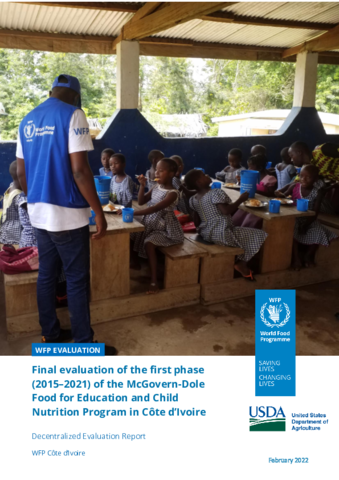
The baseline study for phase II was conducted concurrently with the endline evaluation of phase I, drawing on the same data set and indicators. The baseline study at hand provides program benchmarks for the period from 2021 to 2026. The data collection, analysis, reporting, and dissemination for this evaluation took place from November 2021 to September 2022, with fieldwork taking place in November and December 2021.
This endline report compares the situation of the programme at endline (2021) against the baseline (in 2016) and midline (2019). At end-line the purpose of the evaluation was to provide an independent assessment of: i) the project’s relevance, effectiveness, efficiency, coherence, and sustainability; ii) its performance against indicators in comparison with values at baseline and midline.
Key findings from the endline included:
- The McGovern-Dole program is highly relevant to the needs of the target population and is well aligned to the Government of Côte d’Ivoire’s priorities and is consistent with the policies and programs of key partners, including United Nations (UN) agencies, and adheres to the WFP’s humanitarian principles of humanity, impartiality, neutrality, and independence.
- The evaluation shows that many outcomes improved since baseline but many of these improvements have stagnated or even deteriorated since midline. Part of these trends can be explained by the large improvements between baseline and midline, such as the availability of school canteens reaching nearly 100% by midline.
- With regards to literacy, it was found that children were reading at lower levels than at midline.
- In terms of school feeding, quality of canteen services appeared to have declined and the number of canteens serving the minimum dietary diversity standards decreased from 82.5 percent at midline to only 66.8 percent at endline.
- Overall, the WFP carried out the McGovern-Dole program efficiently. The program has a tight budget, which required the WFP to work as cost-efficiently as possible.
- Despite the COVID-19 pandemic and other crises such as insecurity in the north of Côte d’Ivoire, most often the McGovern-Dole activities took place in a timely manner. However, the program did experience some delays in the distribution of literacy materials and a lack of deworming tablets.
- Targeting rural areas with high levels of food insecurity allowed the program to reach areas of most need. In addition, targeting girls to receive dry rations helped promote girls’ school enrolment, although it may have created negative side effects for boys. Targeting women in the WPGs also had unintended consequences because it inadvertently caused women to bear additional costs and workload while it failed to generate income for women.
- Few causal impacts of the program on key child learning or nutrition outcomes were detected. These findings may relate to implementation challenges, such as the findings related to communities struggling to maintain nutritional quality.
- Children’s exposure to school canteens did not increase. However, school canteens already existed in roughly 90 percent of treatment schools at baseline, so there was little room for the program to improve that outcome. no overall impacts for dietary diversity or coping strategies were found, households of the girls in our sample were more likely to eat certain nutritious foods, such as leafy green vegetables, fruit, and dairy.
- The key factors affecting the sustainability of the program are funding and government commitment to activities and policies. Although WPGs and COGES were committed to continuing their ongoing contributions to the schools, the program’s ability to continue without some continued financial assistance and ongoing training is weak.
Key recommendations from the endline study included:
- Track and report on the number days and number of canteen meals in all schools that are supported by WFP and those that are supported by community contributions.
- Consider the potential unintended consequences of gender-specific interventions and supports, such as providing take-home rations to girls only.
- Provide tailored support to WPGs based on their specific needs.
- Work with WPGs to track their crop yields, production, and profitability margin more closely.
- Work with MENA to reinforce teacher professional development.
- Consider potential synergies with programs such as the Education Service Delivery Enhancement Project (PAPSE) which are working towards similar objectives in some of the same areas WFP is operating.
- Work with MENA to determine the feasibility of assessing early reading skills in mother tongue rather than French in schools where teachers are teaching early reading in mother tongue.
| Document | File |
|---|---|
| 2021-2026 Second phase - Mid-term evaluation Terms of reference (English) |
PDF | 961.37 KB
Download
|
| 2021-2026 Second phase - Mid-term evaluation Terms of reference (French) |
PDF | 1.05 MB
Download
|
| 2021-2026 Second phase baseline evaluation report |
PDF | 3.89 MB
Download
|
| 2015-2021 First phase endline management response |
PDF | 347.69 KB
Download
|
| 2015-2021 First phase endline evaluation brief |
PDF | 212.21 KB
Download
|



